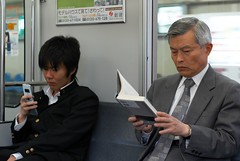Monday, April 26, 2010
"zones of intervention"
I've been reading Carol Kuhlthau's writings about the "Information Search Process" (ISP) lately as research into an article I'm revising on the single search box. In them she reminds me that the early stages of the ISP include a level of anxiety and uncertainty. It is natural for the user of an information system to have an affective response to an information need as well as a cognitive one. The anxiety felt at the beginning of the research process comes from the user's lack of knowledge about the topic of interest, but also from a lack of focus on the topic of interest itself. This is usually where an information professional like a librarian might provide guidance to the user in the form of an interpreter of the information system, or as an interviewer helping to elicit a more focused information query. Kuhlthau writing in 1996 also refers to a "zone of intervention" in the ISP. "The zone of intervention is that area in which an information user can do with advice and assistance what he or she could not do alone. Intervention within this zone enables the user to move along in the information search process. Intervention outside this zone is inefficient and unnecessary; experienced by users as intrusive, on the one side and overwhelming, on the other." (Kuhlthau 1996) Interestingly, Kuhlthau was writing about this zone to address the question, "What is the role of the information professional as intermediary in an environment where information systems provide direct access to the end user?" (Kuhlthau 1996) Fourteen years later the question is still just as incisive, if not moreso since Google Scholar, Federated search, Article databases and link resolvers bring full text library content into the users lap. For remote users searching via the library Web site (the vast majority), that intervention must occur asynchronously through context sensitive help, or not at all. One philosophy of librarianship, — which is admittedly more nuanced than I am giving it credit for here — eschews a simplified search interface and feels that the user requires education and instruction on how to use library resources. I do not necessarily disagree that the user often needs guidance or instruction, but I am of the mind that we ought to be providing the best content possible with the simplest and least mediated interface that we can. Currently, the best technological solution to this issue is the single search box across multiple databases, including commercial search engines. The "zone of intervention" exists post-search when the user is reviewing and interpreting results. The presentation of search results is the most important point at which the librarian has the opportunity to exert their expertise by providing "contextual buttressing" (to borrow a delightful phrase, thanks Kathryn S.) to help searchers understand the types of information they are retrieving.
Thursday, April 22, 2010
Joi Ito photo: Generation Gap
The thread that brought me to this picture started out as a You Tube search for my last name. That in turn lead me to a 2008 talk at UC Berkeley by the (then) President of the Digital Library Federation Peter Brantley. He spoke about his interactions with the newspaper industry as the president of Dig. Lib. Federation.
Generation Gap
Originally uploaded by Joi
Originally uploaded by Joi
Subscribe to:
Posts (Atom)
